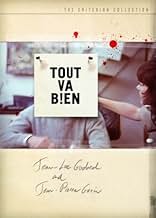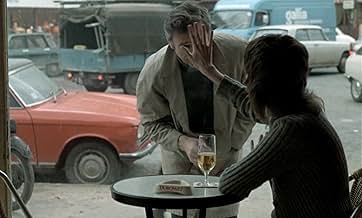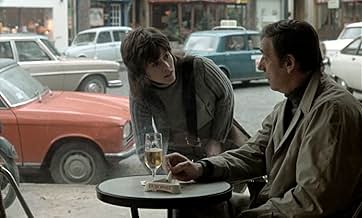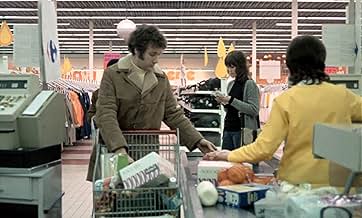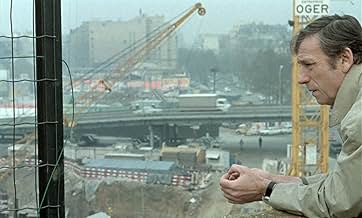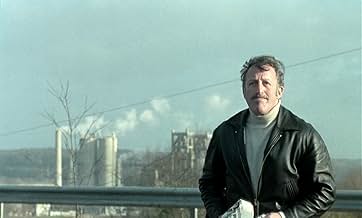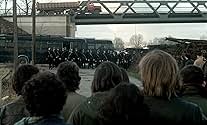NOTE IMDb
6,5/10
4,1 k
MA NOTE
Ajouter une intrigue dans votre langueGodard examines the structure of movies, relationships and revolutions through the life of a couple in Paris.Godard examines the structure of movies, relationships and revolutions through the life of a couple in Paris.Godard examines the structure of movies, relationships and revolutions through the life of a couple in Paris.
- Réalisation
- Scénario
- Casting principal
- Récompenses
- 1 victoire au total
Louis Bugette
- Georges
- (as Bugette)
Yves Gabrielli
- Léon
- (as Yves Gabrieli)
Avis à la une
Godard work sometimes is not entirely understood. having seen most of his films i must say the this film is one of the more comprehensible of the lot. To my understanding it deals with an important issue of the postmodern graded. the issue of how to react to the capitalist society in which we live in. Being disappointed from the communist party, as well as the worker's unions which turned their backs to the working class, the people are left with no alternative but to commence a revolution, one that uses force, one that shakes the basis of society. He also shows how the burglar reporters and film creator as a representing free mind are also been exploited by the capitalist regime and their creative spirits is dying. for the the solution is to continue creating at all cost. to bring the cry of the people, to help the coming revolution. The last scene at the supermarket is quite fantastic, and it shows the decay of the great ideas (a communist part member sells his book at a discount price but doesn't know what's written there, and the youth that stand up to the society rules and help people to leave the supermarket and not pay). I strongly recommend this movie, although you need some patience with Godard's worth the time.
Godard builds his films from scratch. It's not that he shows up on the first day of shooting with no script or idea of what he wants. He simply works from an entirely different angle than most other directors. In an inventive, cerebral, pretentious manor, Godard and his co- director here, Jean-Pierre Gorin, shows us scene after scene. After each one, we naturally ask ourselves questions pertaining to the characters and the story. The story, or should I say the film, unravels further. We then not only ask ourselves the expected question, "What does this movie mean?" We also ask ourselves, "What is this movie about?" Godard drops characters and settings into a stirring pot, sprinkling it with title cards and captions, then pours them all into the oddly shape bowl of a film structure that he has fashioned himself. His cinematic expression is less a communication to and more a confrontation with the audience. He does not make his film easy on you. Still, his cinematography is interesting, and I admire some of his ideas.
Have I made it unclear where Tout Va Bien stands in my opinion? OK. Well, let me tell you that it is quite an interesting film, an especially unpredictable one, yet Godard and Gorin, as the occasional European filmmaker will do, just as Haneke does, enjoy the feeling of being beyond the audience. What is said with Tout Van Bien, politically, socially, sexually, is expressed as if we, the audience, are the ignorant ones he is in disagreement with.
The high points of this film are the presence of Jane Fonda and a very very long sideways steadicam shot that slowly moves from left to right repeatedly across several check-out lines in a grocery store as tension and rage slowly builds.
Have I made it unclear where Tout Va Bien stands in my opinion? OK. Well, let me tell you that it is quite an interesting film, an especially unpredictable one, yet Godard and Gorin, as the occasional European filmmaker will do, just as Haneke does, enjoy the feeling of being beyond the audience. What is said with Tout Van Bien, politically, socially, sexually, is expressed as if we, the audience, are the ignorant ones he is in disagreement with.
The high points of this film are the presence of Jane Fonda and a very very long sideways steadicam shot that slowly moves from left to right repeatedly across several check-out lines in a grocery store as tension and rage slowly builds.
Jean-Luc Godard's follow-up to the ultra-Maoist Weekend, featuring Yves Montand as a former New Wave filmmaker and his wife Jane Fonda, as they become active in a factory takeover. The film is of course very sympathetic to Marxism and perhaps Leninism, but it's certainly toned down from the blood fest that is Weekend, perhaps regrettably. Godard insists on reinterpreting and imposing entirely new ideas about what a film can and ought to be, in this case an intellectualized espousal of the working class struggle. A few moments of daring misce-en-scene are worth mentioning; fist, Godard includes an awesome cutaway of the factory to reveal the power-dynamics of the uprising within, and an elaborate tracking sequence in a supermarket to reveal the gross stupidity of capitalist consumerism. Tout Va Bien is clearly a step-down from Godard's brilliant features of the 60's, but it's still provocative and worth any cinephile's time.
After his four-year, self-imposed Maoist/nihilist "exile," Godard made a temporary -- albeit slight -- overture toward conventional commercial (or "bourgeois," as Godard called it) cinema by combining a leftist political essay with a dissection of human interaction. Alas, the film fails on both these levels; as a study of the male-female relationship, it is nowhere near "Contempt" and "Masculin-Feminin"; as a pure Maoist political tract, it is shallow and mind-numingly boring compared to "Le Gai Savior" and "Vladimir and Rosa." Nevertheless, "Tout va bien" is nonetheless important within Godard's extraordinary body of work, for it marked the beginning of the seven-year process in which his films would gradually shed their ultra-leftist leanings and move towards more universal, humanistic themes, a process that would ultimately cumulate in the excellent "Every Man For Himself." Even true Godard aficionados will be as bored as everyone else, but they should nonetheless go out of their way to secure a copy.
In the wake of May 1968 which effectually bookends the unrivaled movement of Nouvelle Vague, Godard founded Groupe Dziga Vertov (1968-1972), among which Maoist Jean-Pierre Gorin is a key figure, and TOUT VA BIEN is the most well-known works of the group's output, also heralds Godard's seminal transition from narrative tradition to a more essayistic, esoteric platform to which he has cleft ever since.
International star power swells in TOUT VA BIEN, Jane Fonda, freshly copping her first Oscar for KLUTE (1971), but subsequently...
keep reading my review on my blog: cinema omnivore, thanks!
International star power swells in TOUT VA BIEN, Jane Fonda, freshly copping her first Oscar for KLUTE (1971), but subsequently...
keep reading my review on my blog: cinema omnivore, thanks!
Le saviez-vous
- AnecdotesMost of the shots contain all the three colours of the French flag: blue, white and red.
- Citations
Narrator: There'd be farmers who farm. Workers who work. And bourgeois who bourgeois.
- ConnexionsEdited into Bande-annonce de 'Tout va bien' (1972)
- Bandes originalesIl y a du Soleil sur la France
Music by Eric Charden
Lyrics by Frank Thomas and Jean-Michel Rivat
Performed by Stone et Charden
Meilleurs choix
Connectez-vous pour évaluer et suivre la liste de favoris afin de recevoir des recommandations personnalisées
- How long is All's Well?Alimenté par Alexa
Détails
- Durée
- 1h 35min(95 min)
- Mixage
- Rapport de forme
- 1.66 : 1
Contribuer à cette page
Suggérer une modification ou ajouter du contenu manquant

